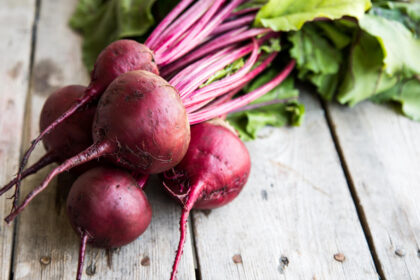
Beetroot is a root vegetable that belongs to the spinach family. There are several varieties of beets, the white which is used in particular by the sugar industry, the yellow and the red which is the most interesting variety from a nutritional and curative point of view.
Indeed, it improves blood circulation and helps the liver eliminate toxins. On the other hand, it is low in calories (43 calories per 100g of beetroot compared to 50 calories for apple).
Beetroot is rich in iron, nitrates, magnesium and vitamins A and B9 (folic acid). If you are pregnant, you should consider incorporating beets into your diet. Since it contains folic acid, it participates in the formation of the child’s spinal cord.
In addition, it is an excellent source of glutamine, an amino acid with the property of strengthening the immune system. But its real secret weapon is its concentration of inorganic nitrates or dietary nitrates. Nitrates (which you will also find in high concentrations in spinach) are naturally transformed into nitric oxide, a molecule which will have the effect of relaxing and widening blood vessels, thus facilitating a supply of oxygen to the cells. The vessels dilate, thereby reducing blood pressure in the muscles including the heart.
A beetroot juice inspired by the famous Russian borscht, a powerful detoxifier and immune system stimulant:
125 ml of beet juice
125 ml of carrot juice
90 ml celery (or cucumber)
juice of half a lemon
1 C. tbsp kefir (or natural yogurt)
Mix all the juices and then add the kefir or yogurt.
Note: It is normal for urine to take on a reddish tint when you regularly consume beetroot. You shouldn’t worry about it.

 Français
Français 


